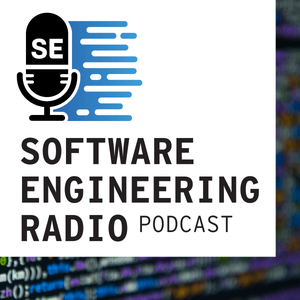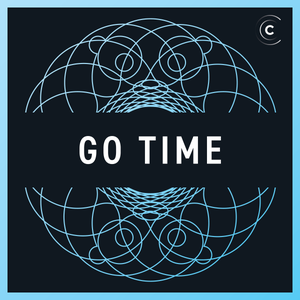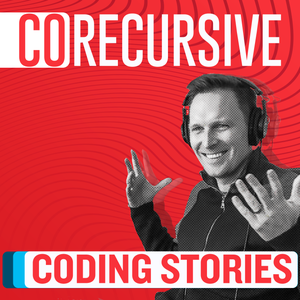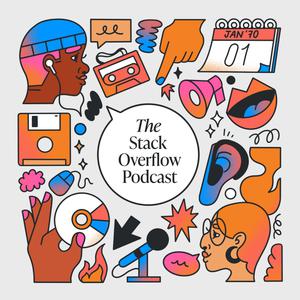
- 51 minutes 50 secondsSE Radio 652: Christian Mesh on OpenTofu
Christian Mesh, tech lead of the OpenTofu project, speaks with host Robert Blumen about OpenTofu. They start with the history of terraform, terraform providers, license changes to open source projects, the origin of OpenTofu as a fork of terraform, and the structure of the OpenTofu organization. They further explore compatibility issues for HCL, providers, and modules, performance issues, and adoption, as well as significant features in the OpenTofu-included dynamic-provider iteration, and the roadmap for the project going forward.
Brought to you by IEEE Computer Society and IEEE Software magazine.
21 January 2025, 10:44 pm - 1 hour 8 minutesSE Radio 651: Paul Frazee on Bluesky and the AT Protocol
Paul Frazee, CTO of Bluesky, speaks with SE Radio's Jeremy Jung about the Authenticated Transfer Protocol (ATProto) used by the Bluesky decentralized social network. They discuss why ATProto was created, as well as how it differs from the ActivityPub open standard, the scaling limitations of peer-to-peer solutions, cryptographic decentralized identifiers, and creating a protocol based on experience with distributed systems. They also examine the role of personal data servers, relays, and app views, the benefits of using domain names, allowing users to create algorithmic feeds and moderation tools, and the challenges of content moderation.
Brought to you by IEEE Computer Society and IEEE Software magazine.
17 January 2025, 2:13 am - 50 minutes 2 secondsSE Radio 650: Robert Seacord on What's New in the C Programming Language
Robert Seacord, the Standardization Lead at Woven by Toyota, the convenor of the C standards committee, and author of The CERT® C Coding Standard, Effective C, and Secure Coding in C and C++, speaks with SE Radio host Gavin Henry about What's New in the C Programming Language.
They start with a review of the history of C and why it has a standard, and then they discuss what C23 brings and how programmers can take advantage of it. They consider the sectors in which C is most used and whether you should use C to start a brand new project in 2025. Seacord discusses 8 new things that C23 brings, use case examples, must haves, floating point numbers, how automotive systems use C, why C is used there, Rust vs C, compile time checks vs static analysis, all the various safety standards they can use, why you should use the right tool for the job and never trust user input no matter the language.
Brought to you by IEEE Computer Society and IEEE Software magazine.
17 January 2025, 2:12 am - 52 minutes 1 secondSE Radio 647: Praveen Gujar on Gen AI for Digital Ad Tech Platforms
Praveen Gujar, Director of Product at LinkedIn, joins SE Radio host Kanchan Shringi for a discussion on how generative AI (GenAI) is transforming digital advertising technology platforms.
The conversation starts with a look at how GenAI facilitates scalable ad content creation, using self-attention mechanisms for customized ad generation. They explore AI's role in simplifying campaign management, automating tasks such as audience targeting and performance measurement. Praveen emphasizes that ad tech platforms use AI models tailored to different needs leveraging both first-party and third-party data sources, with privacy maintained through methods such as CAPI (conversion API). They also consider the differences between retrieval-augmented generation (RAG) and fine-tuning in AI models: Whereas RAG uses brand-specific data at runtime for precise ad content, fine-tuning focuses on broader model optimization. The segment highlights the importance of vector embeddings and vector search in storing and retrieving contextual content. Lastly, Praveen discusses the integration of AI teams within product development to improve collaboration and AI proficiency across organizations.
Brought to you by IEEE Computer Society and IEEE Software magazine.
8 January 2025, 6:57 pm - 58 minutes 14 secondsSE Radio 649: Lukas Gentele on Kubernetes vClusters
Lukas Gentele, CEO of Loft Labs, joins host Robert Blumen for a discussion of kubernetes vclusters (virtual clusters). A vcluster is a kubernetes cluster that runs kubernetes application on a host kubernetes cluster. The conversation covers: vcluster basics; sharing models; what is owned by the vcluster and what is shared with the host; attached nodes versus shared nodes; the primary use case: multi-tenancy vcluster per tenant; alternatives - namespace per tenant, full cluster per tenant; trade-offs - isolation; less resource use; spin up time; scalability; how many clusters and how many vclusters should an org have? Deployment models for vclusters - helm chart with standard resources; vcluster operator; persistent storage models for vclusters; vcluster snapshotting, recovery, and migration. how many vclusters can run on a cluster? ingress, TLS and DNS.
Brought to you by IEEE Computer Society and IEEE Software magazine.
2 January 2025, 9:22 pm - 46 minutes 56 secondsSE Radio 648: Matthew Adams on AI Threat Modeling and Stride GPT
Matthew Adams, Head of Security Enablement at Citi, joins SE Radio host Priyanka Raghavan to explore the use of large language models in threat modeling, with a special focus on Matthew's work, Stride GPT. The episode kicks off with an overview of threat modeling, its applications, and the stages of the development life cycle where it fits in. They then discuss the STRIDE methodology and strideGPT, highlighting practical examples, the technology stack behind the application, and the tool's inputs and outputs. The show concludes with tips and tricks for optimizing tool outputs and advice on other open source projects that utilize generative AI to bolster cybersecurity defenses. Brought to you by IEEE Computer Society and IEEE Software magazine.
27 December 2024, 12:46 am - 57 minutes 8 secondsSE Radio 646: Matthew Skelton on Team Topologies
Matthew Skelton joins host Giovanni Asproni to talk about team topologies—an approach to organizing teams for fast flow of value. The episode starts with a description of the underlying principles before exploring the approach in more detail. From there, they discuss when to consider implementing the approach; keys to a successful implementation; and some common mistakes to avoid. Brought to you by IEEE Computer Society and IEEE Software magazine.
11 December 2024, 11:15 pm - 59 minutes 22 secondsSE Radio 645: Vinay Tripathi on BGP Optimization
Vinay Tripathi, a senior network engineer in Google Backbone Engineering and an 18-year network engineering veteran, discusses BGP optimization, a technique that's critical in achieving top goals in distributed applications. Host Philip Winston speaks with Tripathi about BGP, autonomous systems, peer grouping, router hardware and software, software-defined networks, and shared network optimization and debugging stories. Brought to you by IEEE Computer Society and IEEE Software magazine.
4 December 2024, 1:37 am - 1 hour 9 minutesSE Radio 644: Tim McNamara on Error Handling in Rust
Tim McNamara, a well-known Rust educator, author of Rust in Action (Manning), and a recipient of a Rust Foundation Fellowship in 2023, speaks with SE Radio host Gavin Henry about error handling in Rust. They discuss the errors that Rust prevents, what an error is in Rust, what Tim classes as the "four levels of error handling," and the lifecycle of your journey reaching for them.
McNamara explains why Rust handles errors as it does, how it differs from other languages, and what the developer experience is like in dealing with Rust errors. He advocates best practices for error handling, what Result is, the power of Rust Enums, what the question mark operator is, when to unwrap, what Box really means, how to deal with errors across the FFI boundary, and the various Rust error-handling crates that you can use to give you more control.
Brought to you by IEEE Computer Society and IEEE Software magazine.
30 November 2024, 11:01 pm - 53 minutes 15 secondsSE Radio 643: Ganesh Datta on Production Readiness
Ganesh Datta, co-founder of Cortex.io, joins host Robert Blumen for a conversation about production readiness. The conversation covers the history of production readiness; its relationship to microservice architecture; the Google SRE model's impact on production readiness; production readiness checklists; the process; and production readiness transparency.
20 November 2024, 9:18 pm - 1 hour 7 minutesSE Radio 642: Simon Wijckmans on Third-Party Browser Script Security
Simon Wijckmans, founder of c/side -- a company that focuses on monitoring, securing, and optimizing third-party JavaScript -- joins SE Radio host Kanchan Shringi for a conversation about the security risks posed by third-party browser scripts. Through real-world examples and insights drawn from his work in web security, Simon highlights the dangers, including malicious attacks such as the recent Polyfill.io incident. He emphasizes the need for vigilant monitoring, as these third-party scripts remain essential for website functionalities like analytics, chatbots, and ads, despite their potential vulnerabilities. Simon explores the use of self-hosting solutions and content security policies (CSPs) to minimize risks, but he stresses that these measures alone are insufficient to fully safeguard websites.
As the discussion continues, they delve into the importance of layering security approaches. Simon advocates for combining techniques like CSPs, real-time monitoring, and AI-driven analysis, which his company c/side employs to detect and block malicious scripts. He also touches on the complexities of securing single-page applications (SPAs), which allow scripts to persist across pages without full reloads, increasing the attack surface for third-party vulnerabilities. Brought to you by IEEE Computer Society and IEEE Software magazine.
13 November 2024, 8:17 pm - More Episodes? Get the App
- https://www.se-radio.net
- en-us
Your feedback is valuable to us. Should you encounter any bugs, glitches, lack of functionality or other problems, please email us on [email protected] or join Moon.FM Telegram Group where you can talk directly to the dev team who are happy to answer any queries.
 Software Engineering Daily
Software Engineering Daily
 Go Time: Golang, Software Engineering
Go Time: Golang, Software Engineering
 CoRecursive: Coding Stories
CoRecursive: Coding Stories
 The Stack Overflow Podcast
The Stack Overflow Podcast
 The Changelog: Software Development, Open Source
The Changelog: Software Development, Open Source
 Thoughtworks Technology Podcast
Thoughtworks Technology Podcast